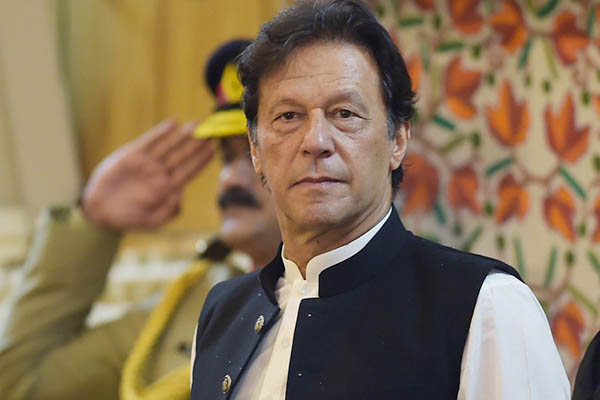
File photo of Prime Minister Imran Khan. Aamir Qureshi—AFP
Pakistan’s prime minister claims MTI Ordinance will bring government healthcare facilities on par with private institutions
The absence of any rewards or penalties for healthcare professionals at government-run hospitals resulted in the deterioration of services at state facilities, Prime Minister Imran Khan said on Wednesday.
Addressing media at the inauguration ceremony of Peshawar’s Institute of Cardiology, he said that his government’s aim was to ensure the impoverished received the best care at state-run hospitals. Referring to a planned protest against the Medical Teaching Institution Ordinance by employees of Islamabad’s Pakistan Institute of Medical Sciences, the prime minister said this was a “strike against hospital reforms.” Addressing the detractors, he said these “reforms” would bring government hospitals on par with private institutions.
“This is why private hospitals succeed,” he said, stressing that this was not “privatization.” Under the MTI, he said, a board of governors would run the facility as a “private organization,” awarding good doctors and penalizing those with poor performance. “This will fix the management system of government hospitals,” he added.
President Arif Alvi promulgated the MTI Ordinance last month, prompting healthcare professionals of PIMS to protest against the move and demand it be rescinded. Special Assistant to the P.M. on Health Dr. Faisal Sultan has claimed that the MTI would aid in “speedy decision-making,” benefiting both employees and patients. “The employees should know that all of their demands cannot be accepted,” he added.
Cardiology institute
During his address, the prime minister congratulated Khyber-Pakhtunkhwa Chief Minister Mahmood Khan on the completion of the cardiology institute despite limited resources. “The absence of a dedicated cardiac facility in the province was a grave injustice for local residents,” he said, adding that the quality of the new cardiology institute would even attract patients from Afghanistan from treatment.
Khan also hailed his government’s decision to roll out health cards for the impoverished segment of society, terming it a “brilliant initiative” that would yield long-term benefits for the people of both Khyber-Pakhtunkhwa and Punjab. “Nothing can be more beneficial for the people of Khyber-Pakhtunkhwa than the facilities provided under the health card. An entire household goes below the poverty line if a single member of the family is suffering from ailments,” he said, noting that cardiac and cancer patients cause the most deaths every year globally.
“The health card will revolutionize Pakistan, hospitals will be built everywhere in the country,” he said, noting that this would not only attract investment from the private sector, but would also put pressure on government hospitals to improve their facilities.
“Countries much richer than ours don’t even provide full health insurance to their people,” he said. “This is truly representative of the Riyasat-e-Madina,” he added.
The prime minister also discussed the sixth anniversary of the 2014 attack on Peshawar’s Army Public School, noting that it had united Pakistan in the fight against terrorism. The gruesome tragedy resulted in the deaths of 148 people, mostly children, at the hands of militants aligned with the Tehreek-e-Taliban Pakistan.
“After the APS attack in 2014, our people decided to fight the war against terrorism together and now you can see that the law-and-order situation of the country is completely different,” said Khan.
